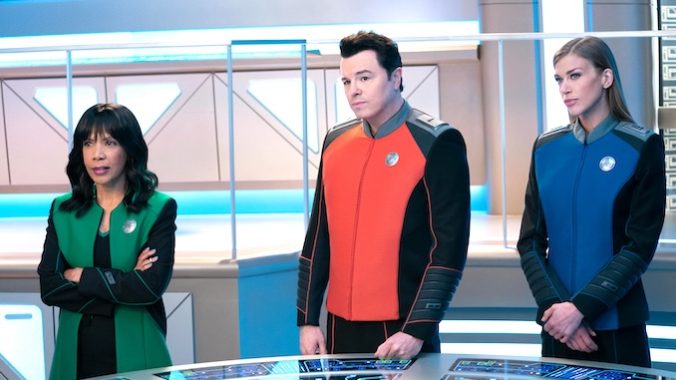TV Rewind: The Orville Is the Most Heartfelt of TV Love Letters
Photo Courtesy of Hulu
Editor’s Note: Welcome to our TV Rewind column! The Paste writers are diving into the streaming catalogue to discuss some of our favorite classic series as well as great shows we’re watching for the first time. Come relive your TV past with us, or discover what should be your next binge watch below:

I have been on something of a Seth MacFarlane journey as of late. Before watching Ted earlier this year, I had written off his style of humor (and, admittedly, his entire film and TV repertoire) as just not my cup of tea, and had been content to live my life completely Family Guy-free. But then I watched Ted, Peacock’s hilarious and surprisingly heartfelt talking teddy bear prequel, and absolutely loved it. Craving more from this creator that I had completely written off—and after eating a healthy dose of crow—I jumped into FOX and Hulu’s The Orville.
Following Captain Ed Mercer (MacFarlane) of the USS Orville, The Orville catalogs the adventures and exploits of the titular starship, its patchwork crew, and the trials and tribulations of the Planetary Union, a combined alliance of numerous planets, alien species, and outer space territories working together 400+ years in our future to insure the universe remains peaceful and progressive. Joined by his incredible crew—which features his adulterous ex-wife and Second Officer Kelly (Adrianne Palicki), Lieutenant John (J Lee), security chief Alara (Halston Sage), helmsman Lieutenant Gordon (Scott Grimes), Dr. Claire (Penny Johnson Jerald), Lieutenant Commander Bortus (Peter Macon), Kaylon Issac (Mark Jackson), and eventually security chief Talla (Jessica Szohr) and Ensign Charly (Anne Winters)—Ed and The Orville venture to far-off worlds and do their best to help those they can, all while becoming better people themselves along the way.
On the surface, The Orville seems like a run-of-the-mill Star Trek parody, and the first season’s push-and-pull between humor and its more Trekian plotlines is potential evidence that that’s what FOX originally wanted it to be. But it quickly becomes clear that this show, despite engaging in some lighthearted jabs at the conventions of The Next Generation and series like it, is more of a love letter than a hit job. And by the time it airs its final outing (a network change and 36 episodes later), it’s more apparent than ever that MacFarlane and crew have created a world just as rich as the one it originally aimed to parody, becoming an earnest yet lighthearted take on the problems that ravage humanity, set across a backdrop among the stars and led by a crew that aims to leave every place better than they found it. The series deals in moral quandaries but never absolutes, highlighting the very best parts of humanity while holding up a mirror to the undeniable worst.
The Orville’s first season utilizes nostalgia and humor as a gateway, a foot-in-the-door to allow new viewers to become acclimated to this Trek homage, before it finally sheds that skin in its second and third seasons by doubling down on the worlds and people we have come to know and love. The consequence of that early push-and-pull is a bit of a tonal mish-mash as it attempts to balance that humor with its more grounded and earnest ambition, but the second and third seasons finally allow it to blossom into the poignant, simultaneously heartwarming and heart wrenching series it was always meant to be. New Horizons in particular utilizes its shiny Hulu budget and expanded runtimes to thrive as a fully-realized, affecting space drama.
-

-

-

-

-

-

-

-

-

-

-

-

-

-

-

-

-

-

-

-

-

-

-

-

-

-

-

-

-

-

-

-

-

-

-

-

-

-

-

-








































